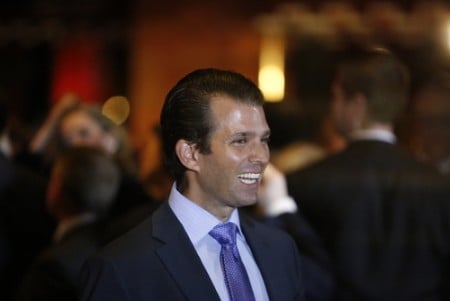Did Donald Trump Jr.'s meeting with Russian lawyer violate election law?

Donald Trump Jr. a katz / Shutterstock.com
A New York Times report about Donald Trump Jr.'s meeting with a Russian lawyer to receive damaging information about Hillary Clinton is raising questions about whether such a meeting would violate election law.
Trump Jr. was informed in an email from an intermediary that the offered information was part of an effort by the Russian government to help his father’s presidential bid, according to the New York Times, which obtained a copy of the email. The email reportedly offered Trump Jr. documents that would “Incriminate Hillary and her dealings with Russia,” and added, “This is obviously very high level and sensitive information but is part of Russia and its government’s support for Mr. Trump.”
Trump Jr. replied, “If it’s what you say I love it especially later in the summer.” He has released the entire chain of emails on Twitter, the Washington Post reports.
Information about Trump Jr.’s meeting has pundits considering the reach of a federal law that bar foreign nationals or foreign governments from giving money or “anything of value” to a political campaign, report the Wall Street Journal (sub. req.) and NBC News. The law also makes it a felony to knowingly and willfully solicit, accept or receive a donation or thing of value from a foreign national.
See also: Meet Donald Trump Jr.’s new lawyer, Alan Futerfas
In complaints filed with the Federal Election Commission and the U.S. Justice Department, Common Cause contends the meeting amounted to a solicitation of helpful information, and that violated the law, the Washington Times reports. But experts who spoke with the publications said it’s unclear whether there was a violation.
Trump Jr. has admitted that he went to the meeting to receive information that could be helpful to the campaign, but did not indicate he thought the lawyer was acting for the Russian government, according to the Times story. Nor is there any indication that the damaging information was related to the computer hack of Democratic emails.
Trump’s son-in-law Jared Kushner and then campaign chairman Paul Manafort also attended the meeting.
Trump Jr. said he ended the meeting after the Russian lawyer offered nothing of consequence and began to talk about a law halting the adoption of Russian children.
University of Buffalo law professor James Gardner said it’s a stretch to define a “thing of value” as information.
“Ordinarily, the term ‘thing of value’ in campaign finance law refers to things that, like money itself, have value as a resource that the recipient can transform into a candidate’s campaign expenditures,” he told the Washington Times. “I would think that there could be constitutional problems in construing ‘thing of value’ so broadly as to include the voluntary provision of information, [such as] speech.”
White-collar litigator Jeffrey Jacobovitz, a partner at Arnall Golden Gregory who has represented Clinton administration officials, told the Washington Post he saw a possible violation of the law.
“You may have crossed the line on conspiracy to commit election fraud or conspiracy to obtain information from a foreign adversary,” he said. “You cannot benefit from a foreign adversary in this kind of scenario.”
Here's my statement and the full email chain pic.twitter.com/x050r5n5LQ
— Donald Trump Jr. (@DonaldJTrumpJr) July 11, 2017



